Coca-Cola's Ethical Stance: An Organizational Behavior Analysis
VerifiedAdded on 2022/11/12
|9
|2162
|442
Essay
AI Summary
This essay provides an in-depth analysis of Coca-Cola's ethical stance, primarily focusing on its operations in India. It examines the company's ethical issues through the lens of Johnson's Intensity of Ethical Stance, exploring short-term and long-term shareholder interests, multiple stakeholder obligations, and the role of the company as a shaper of society. The essay highlights specific instances of ethical concerns, such as water pollution, environmental damage, and alleged mistreatment of employees. It references the negative impacts of Coca-Cola's practices, including water shortages and environmental degradation, and discusses the company's responses to these issues. Furthermore, the essay includes recommendations for Coca-Cola to improve its ethical conduct, emphasizing quality control, adherence to regulations, and the promotion of equality. The essay concludes by underscoring the importance of ethical practices and corporate social responsibility for the long-term sustainability and reputation of the company.
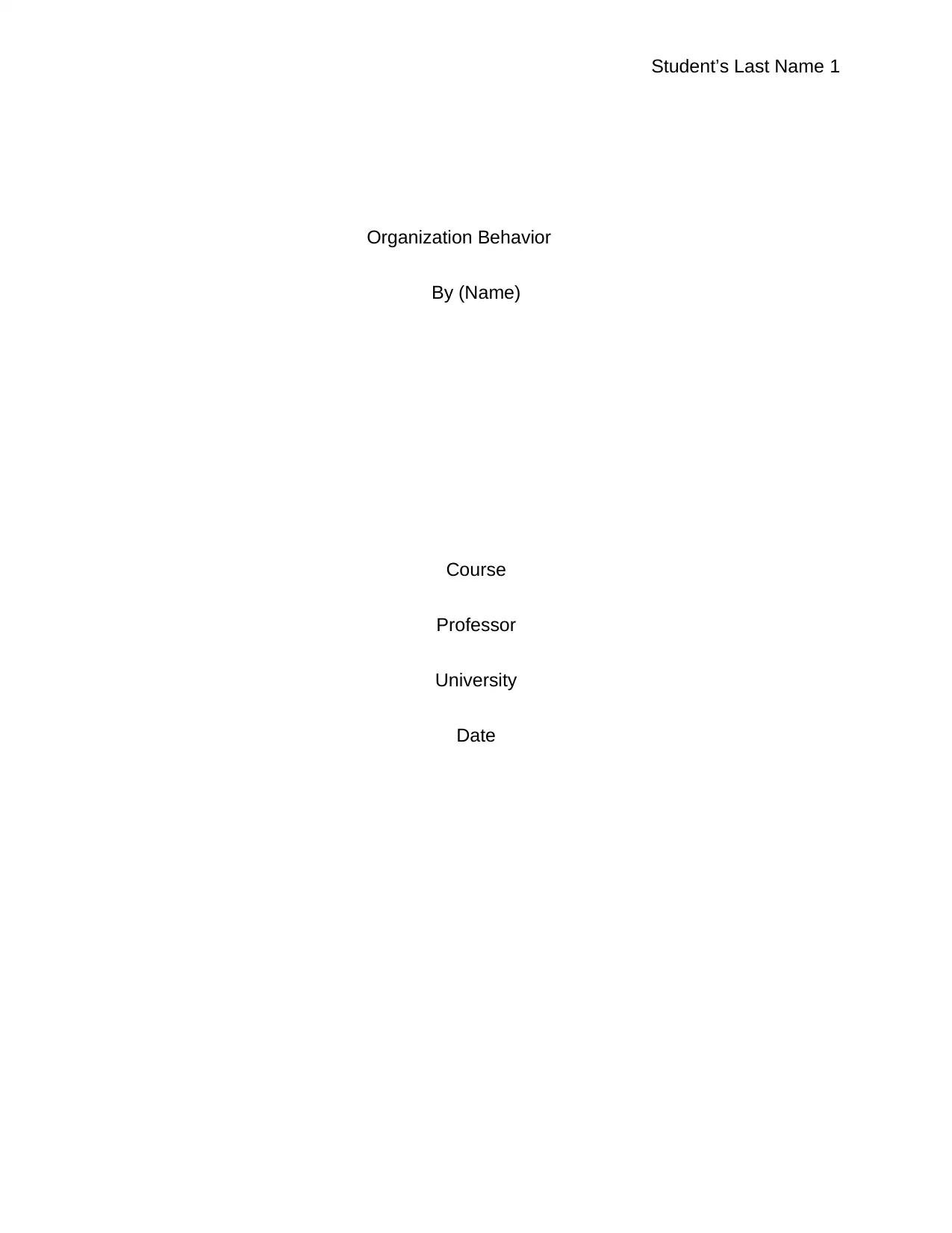
Student’s Last Name 1
Organization Behavior
By (Name)
Course
Professor
University
Date
Organization Behavior
By (Name)
Course
Professor
University
Date
Paraphrase This Document
Need a fresh take? Get an instant paraphrase of this document with our AI Paraphraser
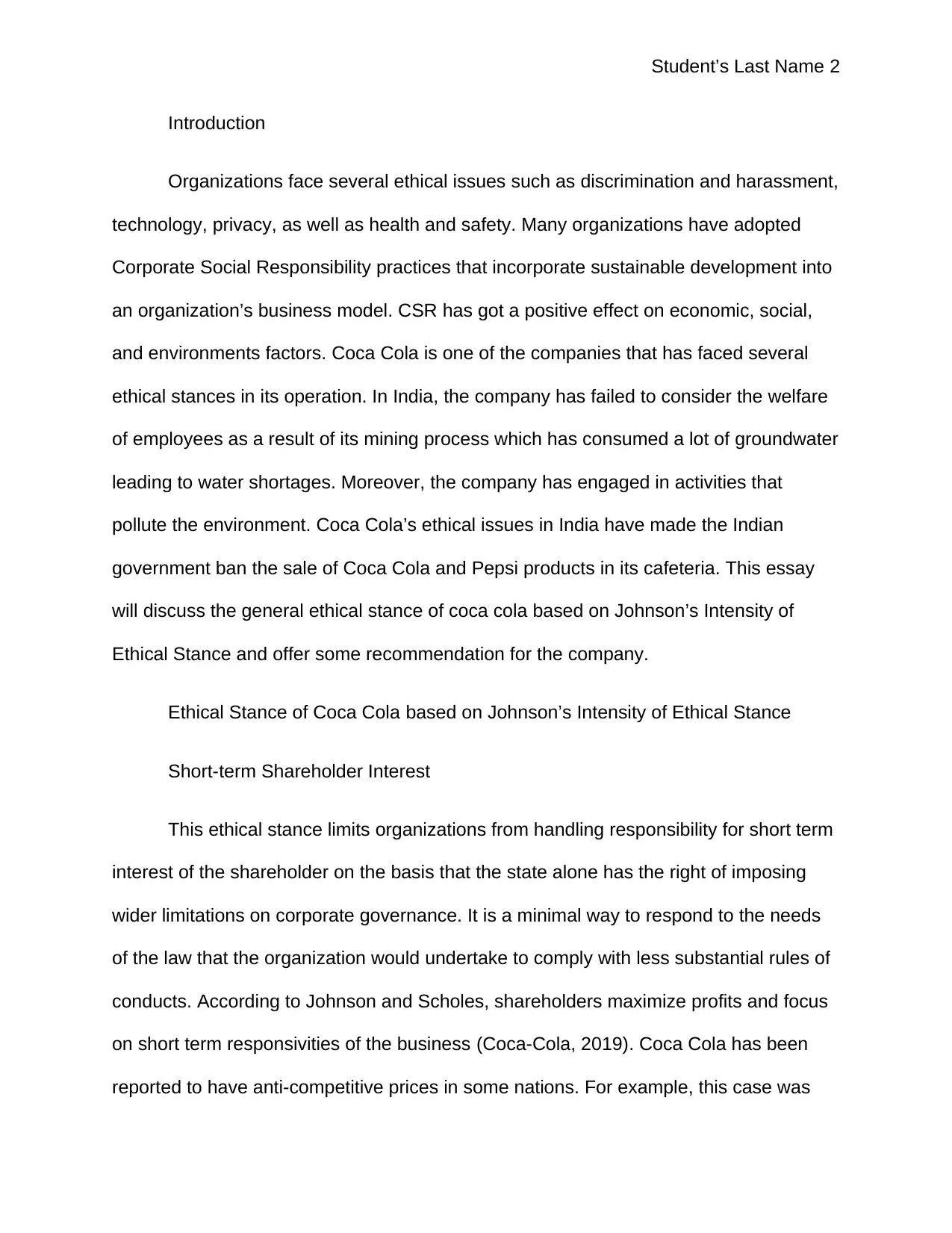
Student’s Last Name 2
Introduction
Organizations face several ethical issues such as discrimination and harassment,
technology, privacy, as well as health and safety. Many organizations have adopted
Corporate Social Responsibility practices that incorporate sustainable development into
an organization’s business model. CSR has got a positive effect on economic, social,
and environments factors. Coca Cola is one of the companies that has faced several
ethical stances in its operation. In India, the company has failed to consider the welfare
of employees as a result of its mining process which has consumed a lot of groundwater
leading to water shortages. Moreover, the company has engaged in activities that
pollute the environment. Coca Cola’s ethical issues in India have made the Indian
government ban the sale of Coca Cola and Pepsi products in its cafeteria. This essay
will discuss the general ethical stance of coca cola based on Johnson’s Intensity of
Ethical Stance and offer some recommendation for the company.
Ethical Stance of Coca Cola based on Johnson’s Intensity of Ethical Stance
Short-term Shareholder Interest
This ethical stance limits organizations from handling responsibility for short term
interest of the shareholder on the basis that the state alone has the right of imposing
wider limitations on corporate governance. It is a minimal way to respond to the needs
of the law that the organization would undertake to comply with less substantial rules of
conducts. According to Johnson and Scholes, shareholders maximize profits and focus
on short term responsivities of the business (Coca-Cola, 2019). Coca Cola has been
reported to have anti-competitive prices in some nations. For example, this case was
Introduction
Organizations face several ethical issues such as discrimination and harassment,
technology, privacy, as well as health and safety. Many organizations have adopted
Corporate Social Responsibility practices that incorporate sustainable development into
an organization’s business model. CSR has got a positive effect on economic, social,
and environments factors. Coca Cola is one of the companies that has faced several
ethical stances in its operation. In India, the company has failed to consider the welfare
of employees as a result of its mining process which has consumed a lot of groundwater
leading to water shortages. Moreover, the company has engaged in activities that
pollute the environment. Coca Cola’s ethical issues in India have made the Indian
government ban the sale of Coca Cola and Pepsi products in its cafeteria. This essay
will discuss the general ethical stance of coca cola based on Johnson’s Intensity of
Ethical Stance and offer some recommendation for the company.
Ethical Stance of Coca Cola based on Johnson’s Intensity of Ethical Stance
Short-term Shareholder Interest
This ethical stance limits organizations from handling responsibility for short term
interest of the shareholder on the basis that the state alone has the right of imposing
wider limitations on corporate governance. It is a minimal way to respond to the needs
of the law that the organization would undertake to comply with less substantial rules of
conducts. According to Johnson and Scholes, shareholders maximize profits and focus
on short term responsivities of the business (Coca-Cola, 2019). Coca Cola has been
reported to have anti-competitive prices in some nations. For example, this case was
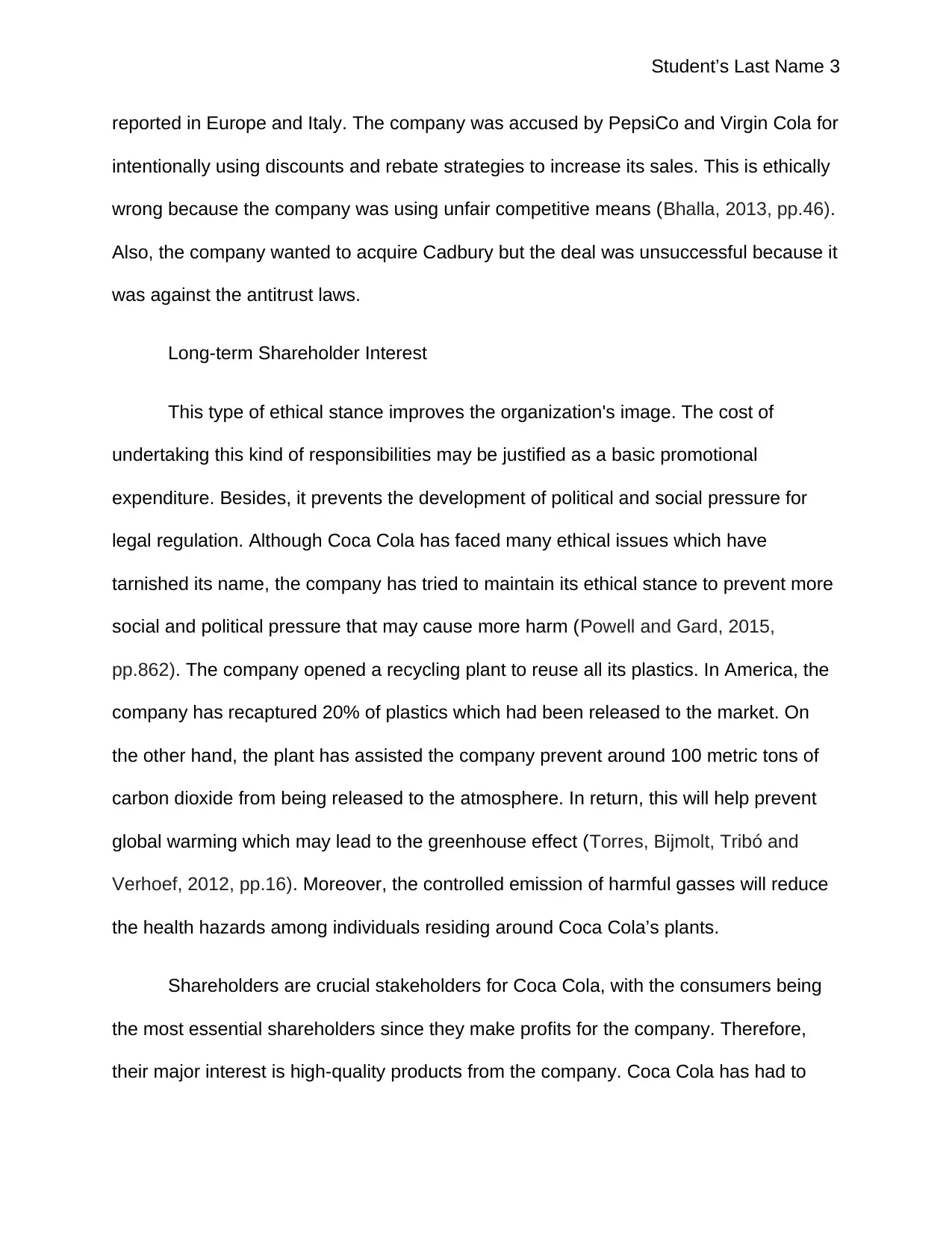
Student’s Last Name 3
reported in Europe and Italy. The company was accused by PepsiCo and Virgin Cola for
intentionally using discounts and rebate strategies to increase its sales. This is ethically
wrong because the company was using unfair competitive means (Bhalla, 2013, pp.46).
Also, the company wanted to acquire Cadbury but the deal was unsuccessful because it
was against the antitrust laws.
Long-term Shareholder Interest
This type of ethical stance improves the organization's image. The cost of
undertaking this kind of responsibilities may be justified as a basic promotional
expenditure. Besides, it prevents the development of political and social pressure for
legal regulation. Although Coca Cola has faced many ethical issues which have
tarnished its name, the company has tried to maintain its ethical stance to prevent more
social and political pressure that may cause more harm (Powell and Gard, 2015,
pp.862). The company opened a recycling plant to reuse all its plastics. In America, the
company has recaptured 20% of plastics which had been released to the market. On
the other hand, the plant has assisted the company prevent around 100 metric tons of
carbon dioxide from being released to the atmosphere. In return, this will help prevent
global warming which may lead to the greenhouse effect (Torres, Bijmolt, Tribó and
Verhoef, 2012, pp.16). Moreover, the controlled emission of harmful gasses will reduce
the health hazards among individuals residing around Coca Cola’s plants.
Shareholders are crucial stakeholders for Coca Cola, with the consumers being
the most essential shareholders since they make profits for the company. Therefore,
their major interest is high-quality products from the company. Coca Cola has had to
reported in Europe and Italy. The company was accused by PepsiCo and Virgin Cola for
intentionally using discounts and rebate strategies to increase its sales. This is ethically
wrong because the company was using unfair competitive means (Bhalla, 2013, pp.46).
Also, the company wanted to acquire Cadbury but the deal was unsuccessful because it
was against the antitrust laws.
Long-term Shareholder Interest
This type of ethical stance improves the organization's image. The cost of
undertaking this kind of responsibilities may be justified as a basic promotional
expenditure. Besides, it prevents the development of political and social pressure for
legal regulation. Although Coca Cola has faced many ethical issues which have
tarnished its name, the company has tried to maintain its ethical stance to prevent more
social and political pressure that may cause more harm (Powell and Gard, 2015,
pp.862). The company opened a recycling plant to reuse all its plastics. In America, the
company has recaptured 20% of plastics which had been released to the market. On
the other hand, the plant has assisted the company prevent around 100 metric tons of
carbon dioxide from being released to the atmosphere. In return, this will help prevent
global warming which may lead to the greenhouse effect (Torres, Bijmolt, Tribó and
Verhoef, 2012, pp.16). Moreover, the controlled emission of harmful gasses will reduce
the health hazards among individuals residing around Coca Cola’s plants.
Shareholders are crucial stakeholders for Coca Cola, with the consumers being
the most essential shareholders since they make profits for the company. Therefore,
their major interest is high-quality products from the company. Coca Cola has had to
⊘ This is a preview!⊘
Do you want full access?
Subscribe today to unlock all pages.

Trusted by 1+ million students worldwide
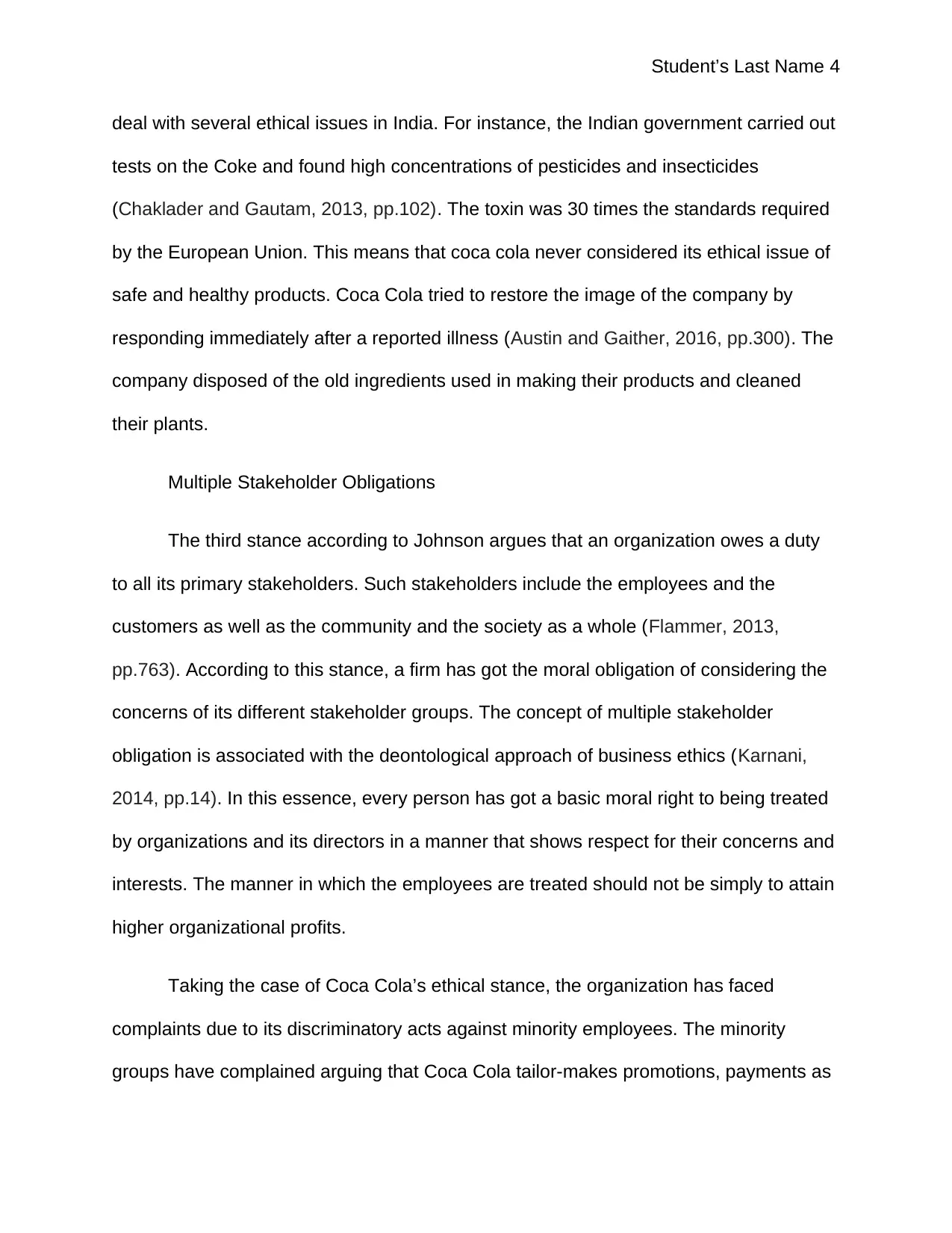
Student’s Last Name 4
deal with several ethical issues in India. For instance, the Indian government carried out
tests on the Coke and found high concentrations of pesticides and insecticides
(Chaklader and Gautam, 2013, pp.102). The toxin was 30 times the standards required
by the European Union. This means that coca cola never considered its ethical issue of
safe and healthy products. Coca Cola tried to restore the image of the company by
responding immediately after a reported illness (Austin and Gaither, 2016, pp.300). The
company disposed of the old ingredients used in making their products and cleaned
their plants.
Multiple Stakeholder Obligations
The third stance according to Johnson argues that an organization owes a duty
to all its primary stakeholders. Such stakeholders include the employees and the
customers as well as the community and the society as a whole (Flammer, 2013,
pp.763). According to this stance, a firm has got the moral obligation of considering the
concerns of its different stakeholder groups. The concept of multiple stakeholder
obligation is associated with the deontological approach of business ethics (Karnani,
2014, pp.14). In this essence, every person has got a basic moral right to being treated
by organizations and its directors in a manner that shows respect for their concerns and
interests. The manner in which the employees are treated should not be simply to attain
higher organizational profits.
Taking the case of Coca Cola’s ethical stance, the organization has faced
complaints due to its discriminatory acts against minority employees. The minority
groups have complained arguing that Coca Cola tailor-makes promotions, payments as
deal with several ethical issues in India. For instance, the Indian government carried out
tests on the Coke and found high concentrations of pesticides and insecticides
(Chaklader and Gautam, 2013, pp.102). The toxin was 30 times the standards required
by the European Union. This means that coca cola never considered its ethical issue of
safe and healthy products. Coca Cola tried to restore the image of the company by
responding immediately after a reported illness (Austin and Gaither, 2016, pp.300). The
company disposed of the old ingredients used in making their products and cleaned
their plants.
Multiple Stakeholder Obligations
The third stance according to Johnson argues that an organization owes a duty
to all its primary stakeholders. Such stakeholders include the employees and the
customers as well as the community and the society as a whole (Flammer, 2013,
pp.763). According to this stance, a firm has got the moral obligation of considering the
concerns of its different stakeholder groups. The concept of multiple stakeholder
obligation is associated with the deontological approach of business ethics (Karnani,
2014, pp.14). In this essence, every person has got a basic moral right to being treated
by organizations and its directors in a manner that shows respect for their concerns and
interests. The manner in which the employees are treated should not be simply to attain
higher organizational profits.
Taking the case of Coca Cola’s ethical stance, the organization has faced
complaints due to its discriminatory acts against minority employees. The minority
groups have complained arguing that Coca Cola tailor-makes promotions, payments as
Paraphrase This Document
Need a fresh take? Get an instant paraphrase of this document with our AI Paraphraser
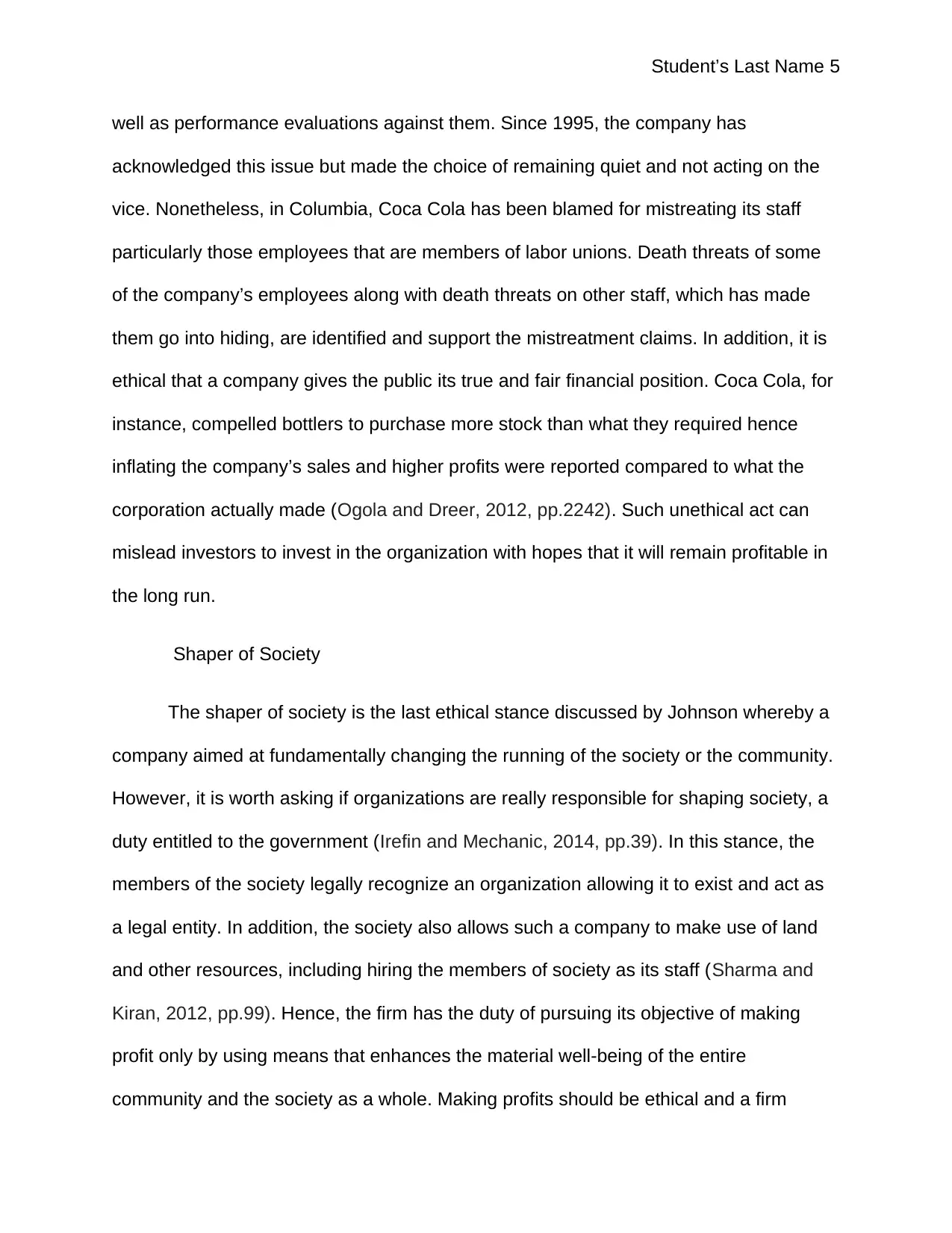
Student’s Last Name 5
well as performance evaluations against them. Since 1995, the company has
acknowledged this issue but made the choice of remaining quiet and not acting on the
vice. Nonetheless, in Columbia, Coca Cola has been blamed for mistreating its staff
particularly those employees that are members of labor unions. Death threats of some
of the company’s employees along with death threats on other staff, which has made
them go into hiding, are identified and support the mistreatment claims. In addition, it is
ethical that a company gives the public its true and fair financial position. Coca Cola, for
instance, compelled bottlers to purchase more stock than what they required hence
inflating the company’s sales and higher profits were reported compared to what the
corporation actually made (Ogola and Dreer, 2012, pp.2242). Such unethical act can
mislead investors to invest in the organization with hopes that it will remain profitable in
the long run.
Shaper of Society
The shaper of society is the last ethical stance discussed by Johnson whereby a
company aimed at fundamentally changing the running of the society or the community.
However, it is worth asking if organizations are really responsible for shaping society, a
duty entitled to the government (Irefin and Mechanic, 2014, pp.39). In this stance, the
members of the society legally recognize an organization allowing it to exist and act as
a legal entity. In addition, the society also allows such a company to make use of land
and other resources, including hiring the members of society as its staff (Sharma and
Kiran, 2012, pp.99). Hence, the firm has the duty of pursuing its objective of making
profit only by using means that enhances the material well-being of the entire
community and the society as a whole. Making profits should be ethical and a firm
well as performance evaluations against them. Since 1995, the company has
acknowledged this issue but made the choice of remaining quiet and not acting on the
vice. Nonetheless, in Columbia, Coca Cola has been blamed for mistreating its staff
particularly those employees that are members of labor unions. Death threats of some
of the company’s employees along with death threats on other staff, which has made
them go into hiding, are identified and support the mistreatment claims. In addition, it is
ethical that a company gives the public its true and fair financial position. Coca Cola, for
instance, compelled bottlers to purchase more stock than what they required hence
inflating the company’s sales and higher profits were reported compared to what the
corporation actually made (Ogola and Dreer, 2012, pp.2242). Such unethical act can
mislead investors to invest in the organization with hopes that it will remain profitable in
the long run.
Shaper of Society
The shaper of society is the last ethical stance discussed by Johnson whereby a
company aimed at fundamentally changing the running of the society or the community.
However, it is worth asking if organizations are really responsible for shaping society, a
duty entitled to the government (Irefin and Mechanic, 2014, pp.39). In this stance, the
members of the society legally recognize an organization allowing it to exist and act as
a legal entity. In addition, the society also allows such a company to make use of land
and other resources, including hiring the members of society as its staff (Sharma and
Kiran, 2012, pp.99). Hence, the firm has the duty of pursuing its objective of making
profit only by using means that enhances the material well-being of the entire
community and the society as a whole. Making profits should be ethical and a firm
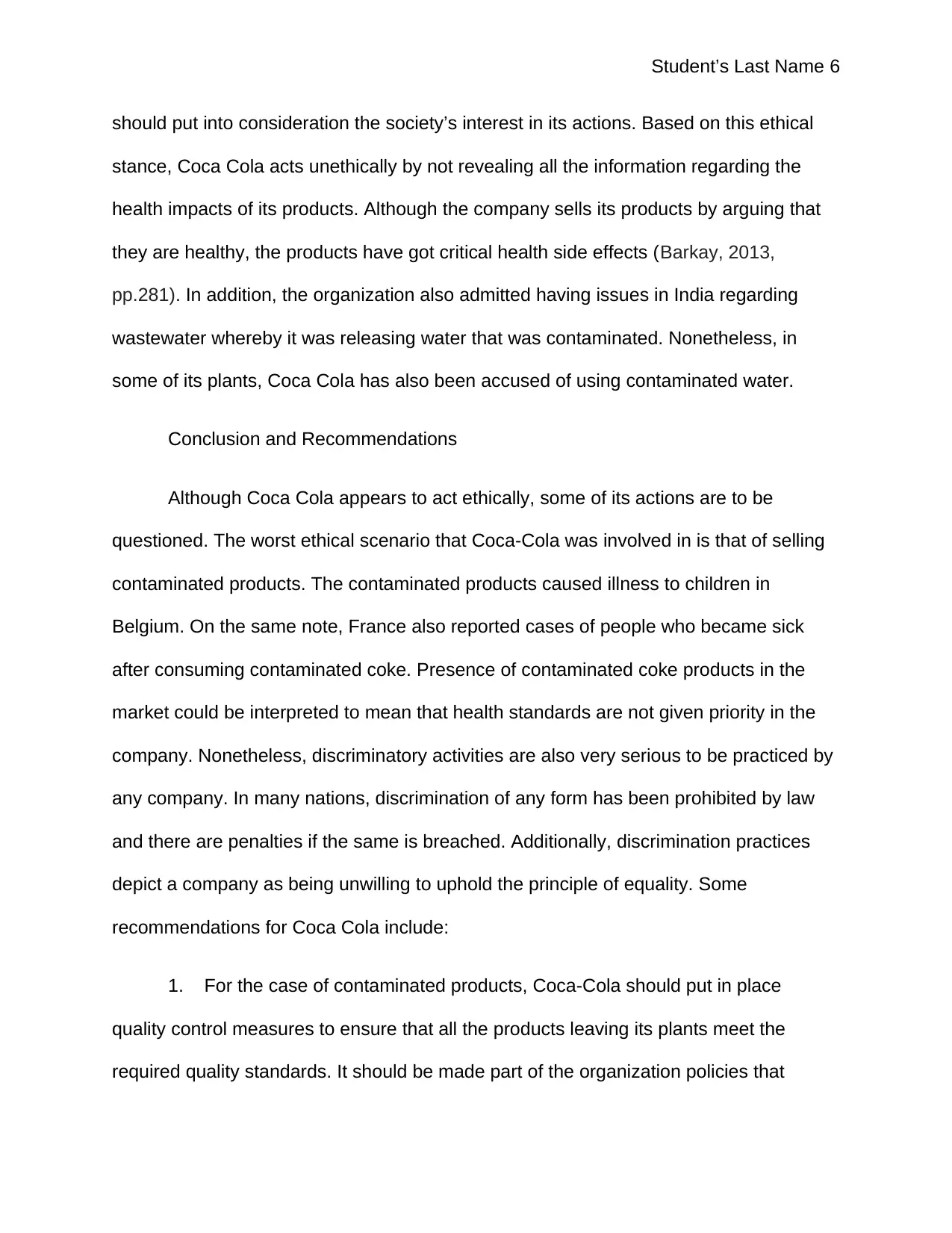
Student’s Last Name 6
should put into consideration the society’s interest in its actions. Based on this ethical
stance, Coca Cola acts unethically by not revealing all the information regarding the
health impacts of its products. Although the company sells its products by arguing that
they are healthy, the products have got critical health side effects (Barkay, 2013,
pp.281). In addition, the organization also admitted having issues in India regarding
wastewater whereby it was releasing water that was contaminated. Nonetheless, in
some of its plants, Coca Cola has also been accused of using contaminated water.
Conclusion and Recommendations
Although Coca Cola appears to act ethically, some of its actions are to be
questioned. The worst ethical scenario that Coca-Cola was involved in is that of selling
contaminated products. The contaminated products caused illness to children in
Belgium. On the same note, France also reported cases of people who became sick
after consuming contaminated coke. Presence of contaminated coke products in the
market could be interpreted to mean that health standards are not given priority in the
company. Nonetheless, discriminatory activities are also very serious to be practiced by
any company. In many nations, discrimination of any form has been prohibited by law
and there are penalties if the same is breached. Additionally, discrimination practices
depict a company as being unwilling to uphold the principle of equality. Some
recommendations for Coca Cola include:
1. For the case of contaminated products, Coca-Cola should put in place
quality control measures to ensure that all the products leaving its plants meet the
required quality standards. It should be made part of the organization policies that
should put into consideration the society’s interest in its actions. Based on this ethical
stance, Coca Cola acts unethically by not revealing all the information regarding the
health impacts of its products. Although the company sells its products by arguing that
they are healthy, the products have got critical health side effects (Barkay, 2013,
pp.281). In addition, the organization also admitted having issues in India regarding
wastewater whereby it was releasing water that was contaminated. Nonetheless, in
some of its plants, Coca Cola has also been accused of using contaminated water.
Conclusion and Recommendations
Although Coca Cola appears to act ethically, some of its actions are to be
questioned. The worst ethical scenario that Coca-Cola was involved in is that of selling
contaminated products. The contaminated products caused illness to children in
Belgium. On the same note, France also reported cases of people who became sick
after consuming contaminated coke. Presence of contaminated coke products in the
market could be interpreted to mean that health standards are not given priority in the
company. Nonetheless, discriminatory activities are also very serious to be practiced by
any company. In many nations, discrimination of any form has been prohibited by law
and there are penalties if the same is breached. Additionally, discrimination practices
depict a company as being unwilling to uphold the principle of equality. Some
recommendations for Coca Cola include:
1. For the case of contaminated products, Coca-Cola should put in place
quality control measures to ensure that all the products leaving its plants meet the
required quality standards. It should be made part of the organization policies that
⊘ This is a preview!⊘
Do you want full access?
Subscribe today to unlock all pages.

Trusted by 1+ million students worldwide
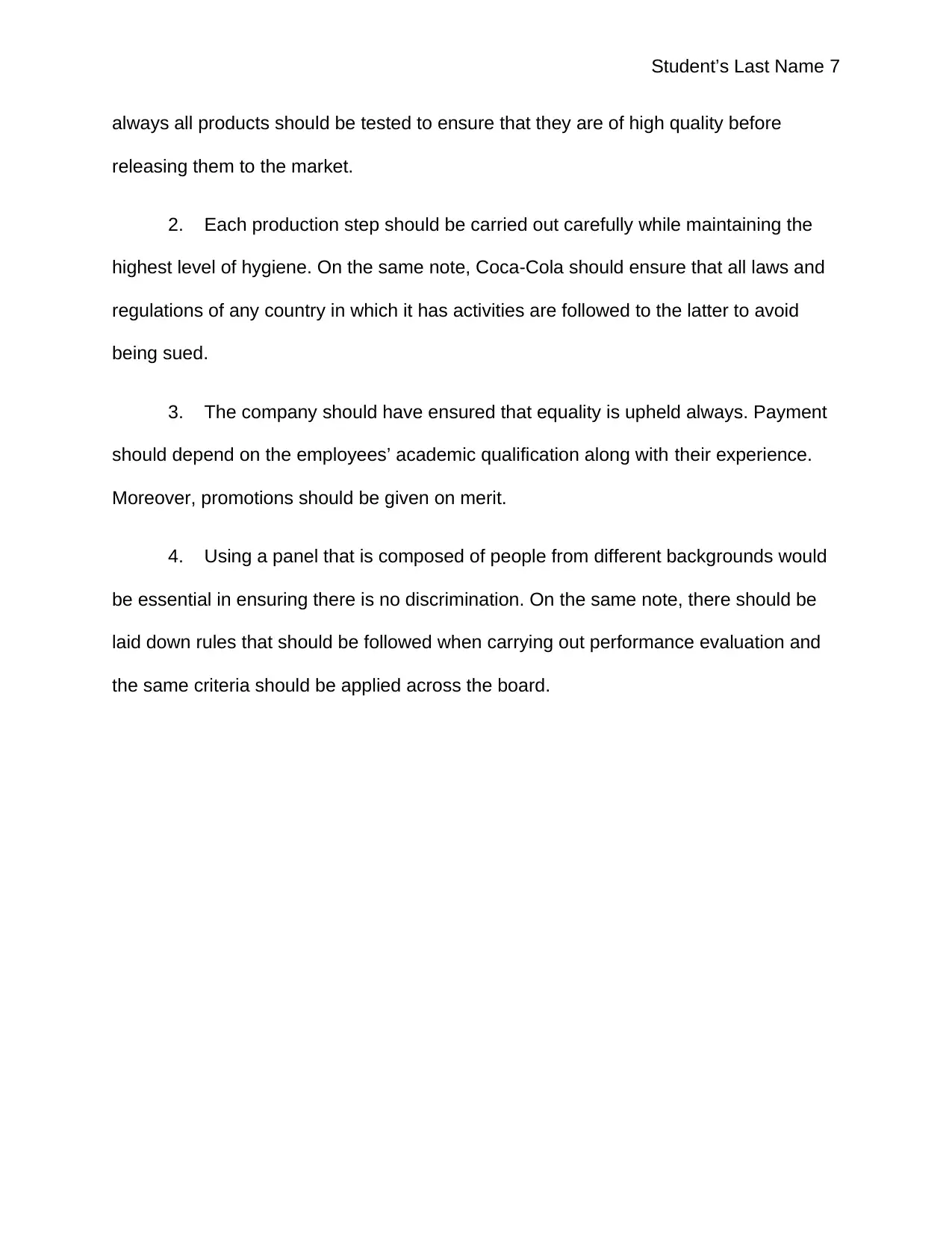
Student’s Last Name 7
always all products should be tested to ensure that they are of high quality before
releasing them to the market.
2. Each production step should be carried out carefully while maintaining the
highest level of hygiene. On the same note, Coca-Cola should ensure that all laws and
regulations of any country in which it has activities are followed to the latter to avoid
being sued.
3. The company should have ensured that equality is upheld always. Payment
should depend on the employees’ academic qualification along with their experience.
Moreover, promotions should be given on merit.
4. Using a panel that is composed of people from different backgrounds would
be essential in ensuring there is no discrimination. On the same note, there should be
laid down rules that should be followed when carrying out performance evaluation and
the same criteria should be applied across the board.
always all products should be tested to ensure that they are of high quality before
releasing them to the market.
2. Each production step should be carried out carefully while maintaining the
highest level of hygiene. On the same note, Coca-Cola should ensure that all laws and
regulations of any country in which it has activities are followed to the latter to avoid
being sued.
3. The company should have ensured that equality is upheld always. Payment
should depend on the employees’ academic qualification along with their experience.
Moreover, promotions should be given on merit.
4. Using a panel that is composed of people from different backgrounds would
be essential in ensuring there is no discrimination. On the same note, there should be
laid down rules that should be followed when carrying out performance evaluation and
the same criteria should be applied across the board.
Paraphrase This Document
Need a fresh take? Get an instant paraphrase of this document with our AI Paraphraser
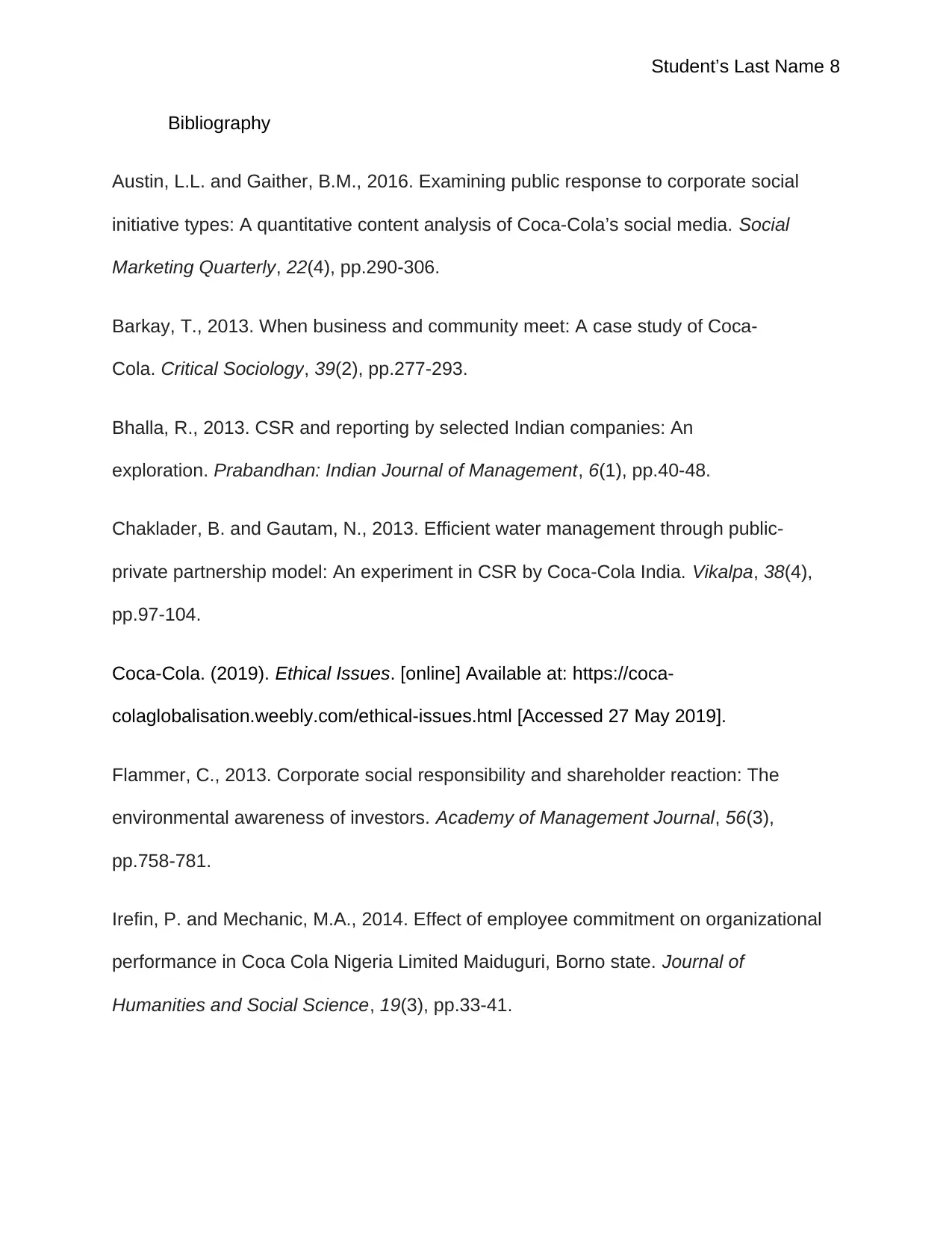
Student’s Last Name 8
Bibliography
Austin, L.L. and Gaither, B.M., 2016. Examining public response to corporate social
initiative types: A quantitative content analysis of Coca-Cola’s social media. Social
Marketing Quarterly, 22(4), pp.290-306.
Barkay, T., 2013. When business and community meet: A case study of Coca-
Cola. Critical Sociology, 39(2), pp.277-293.
Bhalla, R., 2013. CSR and reporting by selected Indian companies: An
exploration. Prabandhan: Indian Journal of Management, 6(1), pp.40-48.
Chaklader, B. and Gautam, N., 2013. Efficient water management through public-
private partnership model: An experiment in CSR by Coca-Cola India. Vikalpa, 38(4),
pp.97-104.
Coca-Cola. (2019). Ethical Issues. [online] Available at: https://coca-
colaglobalisation.weebly.com/ethical-issues.html [Accessed 27 May 2019].
Flammer, C., 2013. Corporate social responsibility and shareholder reaction: The
environmental awareness of investors. Academy of Management Journal, 56(3),
pp.758-781.
Irefin, P. and Mechanic, M.A., 2014. Effect of employee commitment on organizational
performance in Coca Cola Nigeria Limited Maiduguri, Borno state. Journal of
Humanities and Social Science, 19(3), pp.33-41.
Bibliography
Austin, L.L. and Gaither, B.M., 2016. Examining public response to corporate social
initiative types: A quantitative content analysis of Coca-Cola’s social media. Social
Marketing Quarterly, 22(4), pp.290-306.
Barkay, T., 2013. When business and community meet: A case study of Coca-
Cola. Critical Sociology, 39(2), pp.277-293.
Bhalla, R., 2013. CSR and reporting by selected Indian companies: An
exploration. Prabandhan: Indian Journal of Management, 6(1), pp.40-48.
Chaklader, B. and Gautam, N., 2013. Efficient water management through public-
private partnership model: An experiment in CSR by Coca-Cola India. Vikalpa, 38(4),
pp.97-104.
Coca-Cola. (2019). Ethical Issues. [online] Available at: https://coca-
colaglobalisation.weebly.com/ethical-issues.html [Accessed 27 May 2019].
Flammer, C., 2013. Corporate social responsibility and shareholder reaction: The
environmental awareness of investors. Academy of Management Journal, 56(3),
pp.758-781.
Irefin, P. and Mechanic, M.A., 2014. Effect of employee commitment on organizational
performance in Coca Cola Nigeria Limited Maiduguri, Borno state. Journal of
Humanities and Social Science, 19(3), pp.33-41.
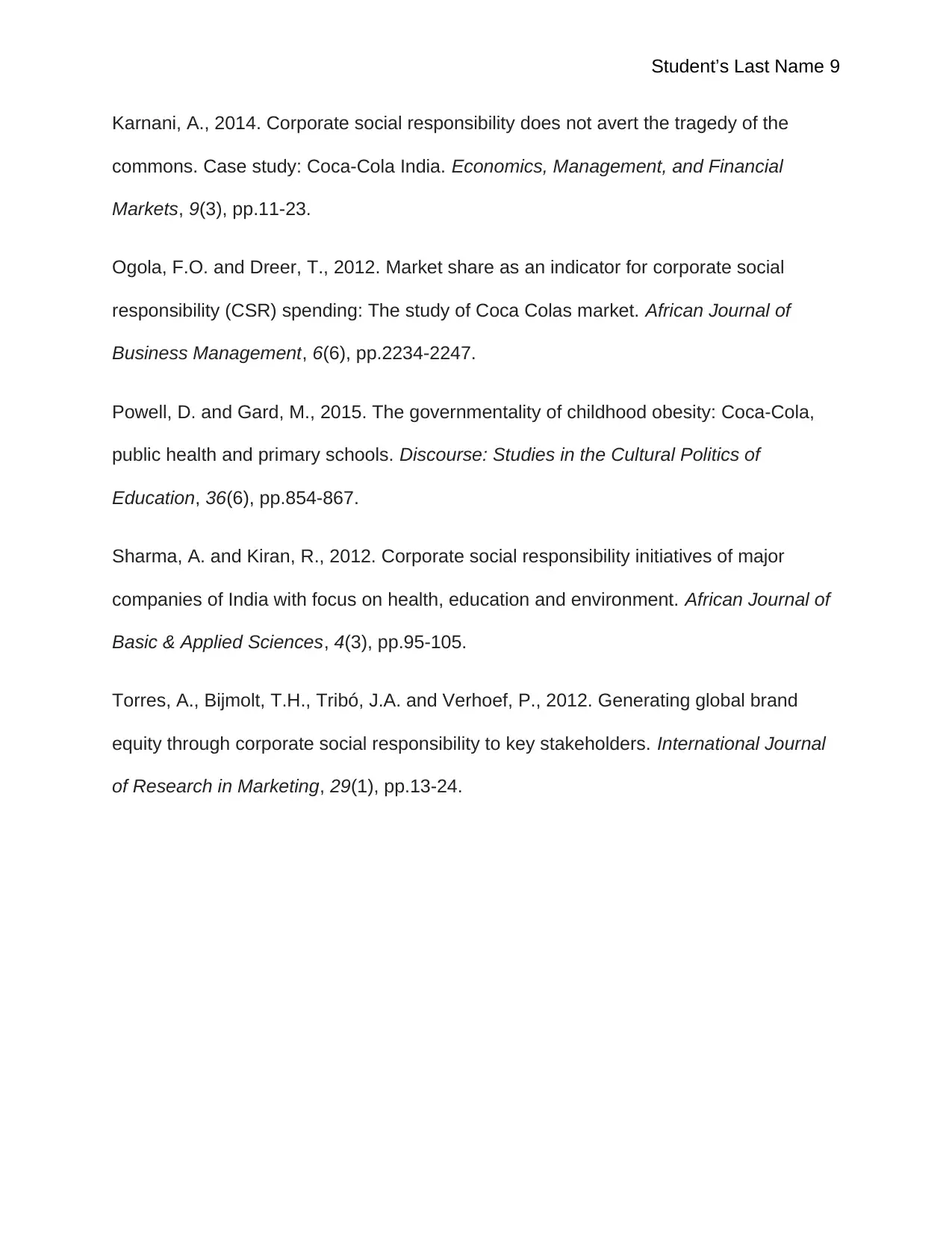
Student’s Last Name 9
Karnani, A., 2014. Corporate social responsibility does not avert the tragedy of the
commons. Case study: Coca-Cola India. Economics, Management, and Financial
Markets, 9(3), pp.11-23.
Ogola, F.O. and Dreer, T., 2012. Market share as an indicator for corporate social
responsibility (CSR) spending: The study of Coca Colas market. African Journal of
Business Management, 6(6), pp.2234-2247.
Powell, D. and Gard, M., 2015. The governmentality of childhood obesity: Coca-Cola,
public health and primary schools. Discourse: Studies in the Cultural Politics of
Education, 36(6), pp.854-867.
Sharma, A. and Kiran, R., 2012. Corporate social responsibility initiatives of major
companies of India with focus on health, education and environment. African Journal of
Basic & Applied Sciences, 4(3), pp.95-105.
Torres, A., Bijmolt, T.H., Tribó, J.A. and Verhoef, P., 2012. Generating global brand
equity through corporate social responsibility to key stakeholders. International Journal
of Research in Marketing, 29(1), pp.13-24.
Karnani, A., 2014. Corporate social responsibility does not avert the tragedy of the
commons. Case study: Coca-Cola India. Economics, Management, and Financial
Markets, 9(3), pp.11-23.
Ogola, F.O. and Dreer, T., 2012. Market share as an indicator for corporate social
responsibility (CSR) spending: The study of Coca Colas market. African Journal of
Business Management, 6(6), pp.2234-2247.
Powell, D. and Gard, M., 2015. The governmentality of childhood obesity: Coca-Cola,
public health and primary schools. Discourse: Studies in the Cultural Politics of
Education, 36(6), pp.854-867.
Sharma, A. and Kiran, R., 2012. Corporate social responsibility initiatives of major
companies of India with focus on health, education and environment. African Journal of
Basic & Applied Sciences, 4(3), pp.95-105.
Torres, A., Bijmolt, T.H., Tribó, J.A. and Verhoef, P., 2012. Generating global brand
equity through corporate social responsibility to key stakeholders. International Journal
of Research in Marketing, 29(1), pp.13-24.
⊘ This is a preview!⊘
Do you want full access?
Subscribe today to unlock all pages.

Trusted by 1+ million students worldwide
1 out of 9
Related Documents
Your All-in-One AI-Powered Toolkit for Academic Success.
+13062052269
info@desklib.com
Available 24*7 on WhatsApp / Email
![[object Object]](/_next/static/media/star-bottom.7253800d.svg)
Unlock your academic potential
Copyright © 2020–2026 A2Z Services. All Rights Reserved. Developed and managed by ZUCOL.





